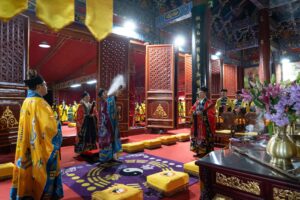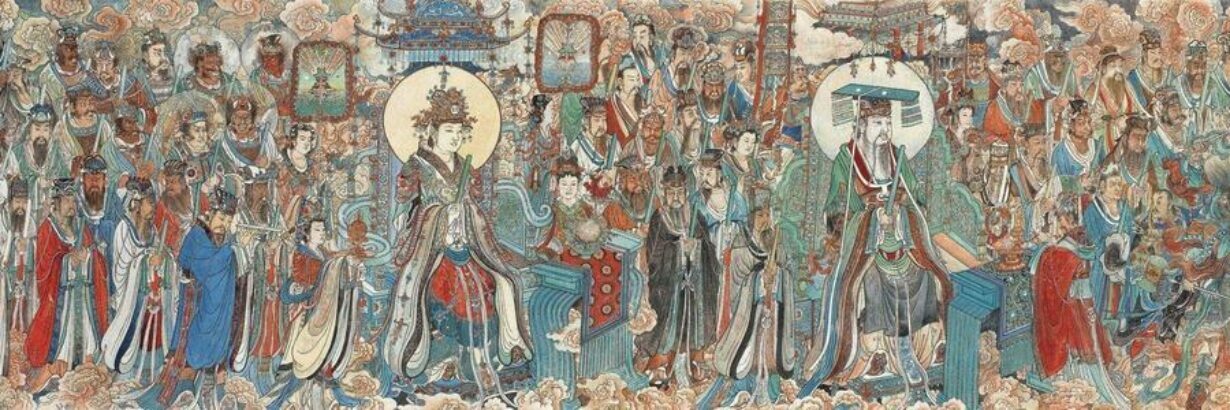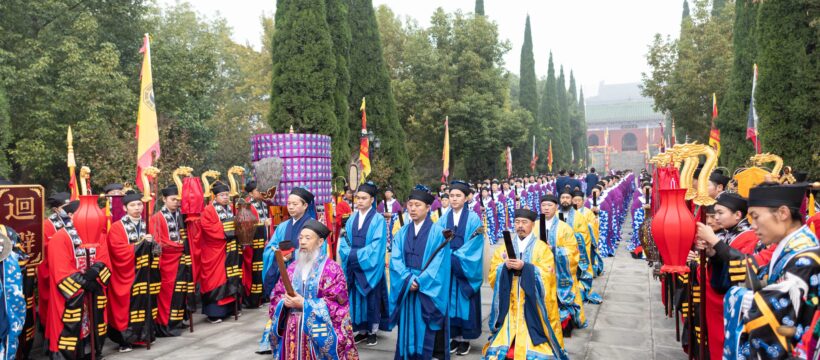In the year Gui Mao (2023) on November 2nd, the 14th day of the transmission of precepts for Daoist disciples at the Jing Le Palace on Wudang Mountain, belonging to the Quanzhen School, took place. This day, which coincides with the Jia Zi day of the 19th day of the ninth lunar month, marks the ascension day of Deity Cihang, a day highly revered in Daoist beliefs. Cihang is known for his great compassion, helping those in distress, and responding to supplications, making him widely venerated among the people.
The activities on the day of the precept transmission included the ritual of examining precepts, the ceremony of offering alms bowls and expressing gratitude to the three altars, and the ceremony of lighting lamps.

Examining Precepts:
The examination of precepts is a mandatory repentance process for disciples receiving precepts. It takes place in front of the Lingguan Hall, where, under the guidance of the Chief Examiner, the disciples confess past transgressions, such as taking life, disobeying parents, and ingratitude to heaven and earth, among thirteen other offenses. The disciples respond with a request for repentance and bow after each offense, symbolizing a purification of the mind and the elimination of sins. After the examination, the master leads the disciples to the abbot’s room for further guidance.
Offering Alms Bowls and Expressing Gratitude to the Three Altars:
The ceremony of offering alms bowls and expressing gratitude to the three altars took place at the Gui Mao altar. This marked the general gratitude for the transmission of the first true precepts. The precepts are considered the first gate in the Quanzhen tradition, and the alms bowl represents the Great Method King, as stated by the founder. Offering alms bowls is a significant practice for Daoist cultivation, aiming to refine one’s nature, discipline the external appearance, calm desires and thoughts, strengthen Daoist mindfulness, and cultivate discipline. Led by the abbot, the precept altar master, and all newly initiated disciples, the ceremony proceeds from the Lingguan Hall to various halls, paying respects and offering written expressions of gratitude to the altars.

Ceremony of Lighting Lamps:
The ceremony of lighting lamps, also known as “Respecting the Trues and Stars” or “Personal Fate Stars” in Daoism, is a ritual used to pray for disaster relief, blessings, longevity, and well-being. This ceremony originated from the worship and reverence of constellations, believed to be connected to the fortune and misfortune of human life. In Daoism, the Northern Dipper Star governs disaster relief, while the Southern Dipper Star is associated with longevity and blessings. The ceremony involves lighting lamps to dispel darkness and guide lost souls. It is considered a powerful means to wash away sins, resolve difficulties, and attract blessings and longevity. The dedication expresses devotion to the supreme deity and acknowledges divine virtues.
Turning to the Heavenly Lord
Doumu’s Proclamation
A ceremony of devotedly turning the heart and surrendering one’s life. In the Western Land of India, amidst great wisdom and radiance, the Teacher of True Emptiness, with marvelous appearances, is the Supreme Profound Origin, the Heavenly Mother. Shining with golden brilliance, hidden radiance like the sun and moon. When the precious vajra turns, even spirits and gods pale in awe. Manifesting miracles in the mortal realm, escorting the Holy One to Underworld. When beings face difficulties, merely invoking the name of the Great Master brings relief. With great compassion and vows, the Great Sage extends immense kindness. Holy virtue, vast radiance, Queen of Heaven, Holy Mother of Dao, Heavenly Venerable with Complete Clarity.”
Gui Mao (2023) Year, the 16th day of the Quanzhen Daoist Transmission of Precepts at Jing Le Palace, Wudang Mountain — Tu Huang Chao Ke, Qiu Zu Chao Ke, Jiu Ku Jing, Jiu Ku Chan, Lecture
Wudang Mountain Daoist Association, published on November 5, 2023, in Hubei
On November 4, 2023, the 21st day of the ninth lunar month in the Gui Mao year, the Quanzhen Daoist transmission of precepts for disciples at Yuan Tian Jing Le Palace on Wudang Mountain entered the sixteenth day. The activities for the day included Tu Huang Chao Ke and Qiu Zu Chao Ke in the morning, Jiu Ku Jing and Jiu Ku Chan in the afternoon, and a lecture for scriptures in the evening.
“Tu Huang Chao Ke”
At 8:30 AM, the ritual of Tu Huang Chao Ke was conducted. Tu Huang Chao Ke is a ceremony to worship the Earth Emperor, involving the opening of the altar, setting up offerings such as incense, flowers, lamps, water, fruits, and other items. Accompanied by the melodious Daoist music of Wudang, Grand Master Lin Xinyong presided over the ceremony, invoking blessings and transmitting energy to the land, breaking negative influences, and praying for auspiciousness. The Earth Emperor, also known as Hou Tu Huang Di Qi, is one of the “Four Imperial Rulers,” revered in Daoism. The full title is “Cheng Tian Xiao Fa Hou Tu Huang Di Qi.” The Four Imperial Rulers in Daoism include Gou Chen Shang Gong Tian Huang Da Di, Zhong Tian Zi Wei Bei Ji Da Di, Cheng Tian Xiao Fa Hou Tu Huang Di Qi, and Nan Ji Chang Sheng Da Di.
In Daoism, the Earth Emperor is venerated as the “Supreme Ruler of All Things, Hou Tu Huang Di Qi” and the “Ruler of the Apocalypse, Tianzun.” Residing beneath the Qiongque, holding a jade seal in one hand and overseeing the thirty-six Earth Emperors, the Earth Emperor governs female deities who are in charge of the beauty of nature, fertility, and the splendor of mountains and rivers. The belief in the Earth Emperor, as part of the Four Imperial Rulers, traces its roots back to ancient worship of the land.

“Qiu Zu Chao Ke”
At 10:00 AM, the ritual of Qiu Zu Chao Ke was conducted. The opening of the Qiu Zu Chao Ke ritual is to pass down the family traditions of Quanzhen. The ceremony began with recitations highlighting the significance of the Quanzhen tradition and Qiu Chuji’s contributions to Daoism.
Qiu Zu, also known as Master Qiu Chuji (1148–1227), is the founding master of the Quanzhen Longmen School, a Daoist sect. He was born in Qixia, Shandong, with the courtesy name Tongmi, and the Daoist name Changchun Zi. Qiu Zu entered monastic life at the age of nineteen, taking Wang Chongyang as his master. During the Yuan Dynasty, Qiu Zu received an imperial decree from Genghis Khan, the founder of the Yuan Dynasty, and led eighteen disciples to answer the call.
With a single utterance, he advocated the cessation of killing and the salvation of all beings. Qiu Zu received a tiger tally and an imperial edict, becoming the overseer of Daoism throughout the realm. Afterward, Qiu Zu extensively distributed documents for salvation, establishing numerous palaces, conducting rituals, and founding the Longmen Vinaya tradition and the administrative system for advanced practitioners, contributing to the revival of Daoism. He authored works such as “Dadan Zhizhi” in two volumes, “Panxi Ji” in six volumes, and “Shengsheng Xiaoxilun” in one volume. His birthday is celebrated on the nineteenth day of the first lunar month.
Afternoon Activities
At 2:30 PM, the ceremony of paying homage to “Jiu Ku Jing” and “Jiu Ku Chan” took place. “Jiu Ku Jing” and “Jiu Ku Chan” are Daoist scriptures aimed at rescuing and consoling departed souls, praising Taiyi Jiu Ku Tianzun for rescuing beings from the lost path, transcending the three realms. Reciting these scriptures continuously is believed to bring great blessings and relieve suffering in the heavenly realms and hell.
The Daoist ritual known as “Zhaijiao” is commonly referred to as “Daochang”, which is what people often mention as Daoist ceremonies. The Daoist ritual can be categorized into Yang Ritual Yin Ritual, and Ritual for both Yin and Yang.
Yang Ritual is a ritual conducted for the living, aimed at dispelling disasters, resolving difficulties, praying for blessings, and seeking longevity. Yin Ritual is performed to help the souls of the deceased who have long been in the underworld. This involves secret rituals conducted by high-level practitioners to refine and transform them, allowing them to transcend the cycle of birth and death and ascend to the realm of immortality. Yin/Yang Ritual is a versatile ritual held on occasions such as the birthday of patriarchs, the ordination of Daoist priests, and the transmission of precepts during ceremonies.
Evening Lecture
At 7:00 PM, the altar welcomed Master Zhou Zhiren to enlighten the female disciples on the “True Nine Precepts for Females” and the practice of female alchemy. Master Zhou explained the origins and content of the “True Nine Precepts for Females,” emphasizing the strict adherence to these precepts for spiritual benefits. The female disciples were encouraged to diligently cultivate wisdom and compassion, with the promise of significant benefits through continuous practice. Master Zhou also introduced the general method of female alchemy, and the female disciples expressed their commitment to following these teachings for boundless blessings.
Gui-Mao (2023) Wudang Mountain Jing Le Palace Quanzhen Daoist Transmission Precepts Day 22 – Morning Transmission of the Fa Tong, Afternoon Precepts Review, Evening Bowing to the Dipper
Wudang Mountain Daoist Academy, Published on November 11, 2023, at 12:15 PM in Hubei
On November 10, 2023, the 22nd day of the Gui-Mao year, Wudang Mountain Jing Le Palace Quanzhen Daoist Transmission Precepts entered its twenty-second day. The content of the ceremony on that day was as follows: Morning transmission of the Fa Tong, afternoon precepts review, and evening bowing to the Dipper.
Transmission of the Fa Tong
At 8:30 in the morning, the Gui-Mao precept altar conducted the transmission of the Fa Tong.
The Fa Tong, fully known as the ‘Supreme Dragon Gate True Lineage of the Grand Ultimate Laws,’ is a sacred certificate for the Quanzhen Daoist transmission of teachings. It contains records of the resumes, native places, and transmission precept ceremonies of generations of great jurists up to the present-day abbot jurist. It is a precious historical document of Quanzhen Daoism. In every Quanzhen transmission of precepts, it is essential to respectfully invite the legal lineage and set up an incense table in the central hall to be worshipped, ready for invocation. This symbolizes the tradition of great jurists speaking at the altar during the transmission of precepts and is the basis for the continuity of the precept lineage. It carries the sacredness of the supreme teacher’s treasure, intending to maintain the pure and sincere faith of the precept disciples and fulfill the original purpose of transmitting precepts.
Precepts Review
At 2:30 in the afternoon, the Gui-Mao precept altar conducted the precepts review, which was the review of the Middle Purity Pure Precepts. The precepts review is a repentance ritual that must be undergone by the disciples receiving precepts. Only by repenting for the past and purifying the body and mind can one attain a pure precept body. Therefore, after receiving precepts in each precept altar, there is a ceremony of precepts review and repentance. The precepts review and repentance can purify the body and mind of all precept disciples and eliminate obstacles to precepts.
Bowing to the Dipper
At 6:30 in the evening, the Gui-Mao precept altar bowed to the ‘Supreme Dark Spirit Northern Dipper Original Life-Prolonging Scripture.’ Taoism believes that the third and twenty-seventh days of the lunar month are the days when the Northern Dipper descends, known as ‘Monthly Dipper.’ Gengshen and Jiazi days are the times when the Northern Dipper patrols the mortal realm, known as ‘Daily Dipper.’ Daily Dipper and Monthly Dipper are the most auspicious times for prayer. Therefore, Taoists generally bow and pay respects to the Dipper on these four days at night.
Taoist bowing to the true Dipper (also known as bowing to the Dipper) is a unique ritual in Taoism for dispelling disasters, resolving crises, praying for peace, and changing fate to prolong life. Bowing to the Dipper began with Zhang Daoling, the Celestial Master of the Eastern Han Dynasty. According to the ‘Blessing Scripture of the Northern Dipper Star Lord’ and the ‘Life-Prolonging Scripture of the Southern Dipper Star Lord,’ Supreme Lord Lao transmitted these two scriptures to Zhang Daoling during the reign of Emperor Huan of Han. Master Zhang transmitted these two scriptures for people to recite, seeking the reduction of sins, the increase of blessings, and the prolongation of life. The Southern Dipper and Northern Dipper Star Lords control the life and death, longevity, and fortune of human beings. Therefore, to dispel disasters, pray for blessings, ward off diseases, and prolong life, people often bow to the Southern and Northern Dippers. During the Three Kingdoms period, Zhuge Liang also bowed to the Dipper to secure the safety of the Seven Stars.
Written and Translated by Daoist Liu Cheng Yong, German Daoist Association.
Original by Wudang Daoist Association

